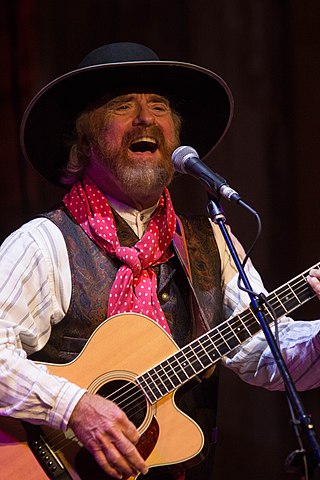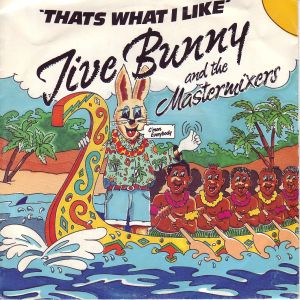Related Research Articles
Jive Bunny and the Mastermixers are a British novelty pop music act from Rotherham, South Yorkshire, England. The face of the group was Jive Bunny, a cartoon rabbit who appeared in their music videos. Costumed actors also made promotional appearances as the character.

A honky-tonk is either a bar that provides country music for the entertainment of its patrons or the style of music played in such establishments. It can also refer to the type of piano used to play such music. Bars of this kind are common in the South and Southwest United States. Many prominent country music artists such as Jimmie Rodgers, Ernest Tubb, Lefty Frizzell, Hank Williams, Patsy Cline, Johnny Horton and Merle Haggard began their careers as amateur musicians in honky-tonks.

Michael Martin Murphey is an American singer-songwriter. He was one of the founding artists of progressive country. A multiple Grammy nominee, Murphey has six gold albums, including Cowboy Songs, the first album of cowboy music to achieve gold status since Gunfighter Ballads and Trail Songs by Marty Robbins in 1959. He has recorded the hit singles "Wildfire", "Carolina in the Pines", "What's Forever For", "A Long Line of Love", "What She Wants", "Don't Count the Rainy Days", and "Maybe This Time". Murphey is also the author of New Mexico's state ballad, "The Land of Enchantment". Murphey has become a prominent musical voice for the Western horseman, rancher, and cowboy.

John Bush Shinn III was an American country music singer, songwriter, and musician. Nicknamed the "Country Caruso", Bush was best known for his distinctive voice and for writing the song "Whiskey River", a top 10 hit for himself which also became the signature song of fellow country artist Willie Nelson. He was especially popular in his native Texas.

"Garden Party" is a 1972 song written by Rick Nelson and recorded by him and the Stone Canyon Band for the album Garden Party. The song tells the story of Nelson being booed at a concert at Madison Square Garden. It was Nelson's last top 40 hit, reaching No. 6 on the U.S. Billboard pop chart.

"Honky Tonk Women" is a song by the English rock band the Rolling Stones. It was released as a non-album single on 4 July 1969 in the United Kingdom, and a week later in the United States. It topped the charts in both nations. The song was on Rolling Stone's 500 Greatest Songs of All Time list, and was inducted into the Grammy Hall of Fame.

Through the Past, Darkly is the third compilation album by the English rock band the Rolling Stones, released in September 1969 by Decca Records in the UK and London Records/ABKCO Records in the US.
"It Might as Well Be Spring" is a song from the 1945 film State Fair. which features the only original film score by the songwriting team of Richard Rodgers and Oscar Hammerstein II. "It Might as Well Be Spring" won the Academy Award for Best Original Song for that year.

"Swing the Mood" is a song by British novelty pop music act Jive Bunny and the Mastermixers, released as the first single from their debut album, Jive Bunny: The Album (1989). Produced by the father and son DJ team of Andy and John Pickles, "Swing the Mood" is a cut and paste record which fused a number of early rock and roll records with liberal use of Glenn Miller's "In the Mood".

"That's What I Like" is a song by British novelty pop music act Jive Bunny and the Mastermixers, released on 2 October 1989 as the second single from their debut album, The Album (1989). It followed "Swing the Mood" to number one in the United Kingdom, Ireland and Spain and went top ten in several countries. In the United States, it failed to build on the success of the group's first hit, peaking at number 69 on the Billboard Hot 100.

"Let's Party" is a song by British novelty pop music act Jive Bunny and the Mastermixers, the third single released by the father-and-son DJ team Andy and John Pickles. Released on 4 December 1989, it reached the top of the UK Singles Chart for a single week the same month. They became only the third act to reach No. 1 with their first three singles, following on from Gerry and the Pacemakers in 1964 and Frankie Goes to Hollywood in 1984, and took the shortest time to achieve the feat.

"At the Hop" is a 1950s pop song written by Artie Singer, John Medora, and David White and originally released by Danny & the Juniors. The song was released in the fall of 1957 and reached number one on the US charts on January 6, 1958, becoming one of the top-selling singles of 1958. "At the Hop" also hit number one on the R&B Best Sellers list. Somewhat more surprisingly, the record reached #3 on the Music Vendor country charts. It was also a big hit elsewhere, which included number 1 for 3 weeks in Canada and a number 3 placing on the UK charts.
"City Lights" is an American country music song written by Bill Anderson on August 27, 1957. He recorded it on a small Texas label called TNT Records in early 1958 to little acclaim. The song was first cut by Anderson in 1957 at the campus of the University of Georgia. In June 1958, Ray Price recorded it and his version hit number 1 on the Billboard Hot Country Songs singles chart in August 1958. Mickey Gilley's version also hit number 1 in June 1975.

Peaks, Valleys, Honky Tonks & Alleys is the eighth album by American singer-songwriter Michael Martin Murphey and his first live album. The first five tracks were recorded at the legendary Palomino Club in North Hollywood, Los Angeles, an important West Coast country music venue. The remaining five tracks are studio recordings. The live tracks showcase Murphey's early work with some interesting twists. His "Cosmic Cowboy" turns into a breakdown, while "Another Cheap Western" is coupled with The Olympics' 1958 hit, "Western Movies". The album produced the singles "Backslider's Wine" and "Chain Gang" that peaked at numbers 92 and 93 on the Billboard Hot Country Singles chart respectively.
"Honky-Tonk Man" is a song co-written and recorded by American singer Johnny Horton. It was released in March 1956 as his debut single on Columbia Records, and the album of the same name reaching number 9 on the U.S. country singles charts. Horton re-released the song six years later, taking it to number 11 on the same chart.
"Tom Hark" is an instrumental South African kwela song from the 1950s, believed to have been composed by Jack Lerole. The song was arranged for penny whistle and first recorded by Elias and His Zig-Zag Jive Flutes – a South African band formed by pennywhistlers Jack and his brother Elias Lerole – and released in 1956. It was later released in the United Kingdom after it was used as a theme on a television series, and it reached number 2 on the UK Singles Chart in 1958.
"There's a Honky Tonk Angel (Who'll Take Me Back In)" is a song best known for the 1974 recording by American country music artist Conway Twitty, who took it to number 1 on the Hot Country Singles chart. The song was written by Troy Seals and Denny Rice and originally released on Troy Seals' 1973 debut album Now Presenting Troy Seals.

"Rock-A-Beatin' Boogie" is a 1952 song composed by Bill Haley and first recorded by the Esquire Boys in 1952. Bill Haley and the Comets recorded the song in 1955 for Decca. The song was featured in the 1956 movie Rock Around the Clock.

Jive Bunny: The Album is the debut album by Jive Bunny and the Mastermixers, released in 1989 by Telstar Records and produced by Les Hemstock and Andy Pickles. It includes two UK number one singles: "Swing the Mood" and "That's What I Like". Each of the album's tracks is made up of a medley of songs and samples from the 1940s to the 1970s.
"Honky-Tonk Girl" is a song co-written and originally recorded by Hank Thompson. Released by him on Capitol Records in 1954, it was a nationwide country hit in the United States that year.
References
- ↑ Marsh, Dave (1989). The Heart of Rock & Soul: The 1001 Greatest Singles Ever Made. Plume. p. 267. ISBN 0-452-26305-0.
- ↑ "The Olympics, "Western Movies" Chart Positions" . Retrieved September 2, 2018.
- ↑ "CHUM Hit Parade - September 1, 1958".
- ↑ "Johnny Worth, "Western Movies" Single Release" . Retrieved September 2, 2018.
- ↑ "Well (Baby Please Don't Go)".
- ↑ "Michael Martin Murphey, Peaks, Valleys, Honky Tonks & Alleys". AllMusic . Retrieved September 2, 2018.
- ↑ "Jive Bunny and the Mastermixers, The Songs of Rodgers & Hammerstein". AllMusic . Retrieved September 2, 2018.
- ↑ "Ray Stevens, Encyclopedia of Recorded Comedy Music". Discogs . Retrieved September 2, 2018.